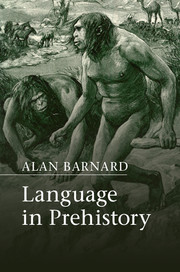Book contents
- Frontmatter
- Dedication
- Contents
- List of figures
- List of tables
- Preface
- 1 Introduction
- 2 Population diversity and language diversity
- 3 What did prehistoric people do?
- 4 How did prehistoric people think?
- 5 Narratives of the every-day
- 6 Mythological narratives
- 7 Sexual selection and language evolution
- 8 Conclusions and thoughts for the future
- Glossary
- References
- Index
7 - Sexual selection and language evolution
Published online by Cambridge University Press: 05 November 2015
- Frontmatter
- Dedication
- Contents
- List of figures
- List of tables
- Preface
- 1 Introduction
- 2 Population diversity and language diversity
- 3 What did prehistoric people do?
- 4 How did prehistoric people think?
- 5 Narratives of the every-day
- 6 Mythological narratives
- 7 Sexual selection and language evolution
- 8 Conclusions and thoughts for the future
- Glossary
- References
- Index
Summary
So what does it mean to be human? Well, the ability to tell a story, to narrate, is an important part of what it means to be human. If narrative is going to be truly useful it will have to be involved in choices, and none more important than the choice of mate. This is important for Darwinian reasons, and it helps us understand why language has grown and improved its ability to express to the extent it has done over the last few tens or even hundreds of thousands of years. Certainly this is more likely than a Bronze Age origin of complex grammar, as Mary LeCron Foster (1999) has argued. Foster sees a seven-stage evolution, from australopithecine communication through imitation, to early Homo sets of semantic associations (for example, enclosing, inward and female, or projecting, outward and male) to the development of communicative systems needing to express things over distances, and so on. Finally, according to Foster, there is proper grammar in the Neolithic (12,000 years ago and later) and ‘language as we know it’ just 3,000 years ago. To my mind, this is far, far too late, even if we concede the influence of farmers on foragers late in the evolution of language. Southern and eastern Africa never went through any Bronze Age, but certainly Africa went through a period when myth, metaphor and very complex grammar occurred, and in spite of the need for people to travel any great distances from their place of origin.
Hadza and Bushman hunter-gatherers have lived in their present locations for millennia, and /Xam, in particular, has developed a very complex grammar, including verbal particles to show things like duration and completion of action, continuous action and repetition (Bleek 1928/9, 1929/30). The sentence in which South Africa's motto is contained has about five degrees of recursion, and it occurs in a traditional piece of folklore probably dating from many centuries ago, and definitely not recent. Certainly, there is no reason to attribute it to anyone other than the hunter-gatherers of South Africa who had lived in the Cape area for many millennia. They are now culturally extinct, though related ethnic groups remain nearby. The motto, incidentally, is !ke e: /xarra //ke, usually translated as ‘Diverse people unite’, or more literally meaning something like ‘People who are different, joining together’ (see Barnard 2003, 2013).
- Type
- Chapter
- Information
- Language in Prehistory , pp. 107 - 120Publisher: Cambridge University PressPrint publication year: 2016



